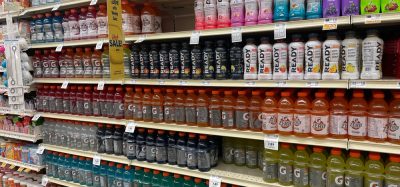Food Safety Knowledge: The Coca-Cola Food Safety Conference… A collaborative initiative
- Like
- Digg
- Del
- Tumblr
- VKontakte
- Buffer
- Love This
- Odnoklassniki
- Meneame
- Blogger
- Amazon
- Yahoo Mail
- Gmail
- AOL
- Newsvine
- HackerNews
- Evernote
- MySpace
- Mail.ru
- Viadeo
- Line
- Comments
- Yummly
- SMS
- Viber
- Telegram
- Subscribe
- Skype
- Facebook Messenger
- Kakao
- LiveJournal
- Yammer
- Edgar
- Fintel
- Mix
- Instapaper
- Copy Link
Posted: 15 December 2010 | Marc Cwikowski, Senior Manager Commercialisation – Global Quality and Product Integrity, The Coca-Cola Company | No comments yet
In December 2009, The Coca-Cola Company (TCCC) held a food safety conference in Shanghai. This was a landmark event for our Company and for the entire food and beverage industry. It involved capability building at all steps in our supply chain, including suppliers and sub-suppliers, and it embraced sharing knowledge and raising the food safety competence for those both within and external to the Coca-Cola System together. Capability sessions were led by Michigan State University (MSU). The training materials were openly made available on the internet in both English and Chinese. Conference learning and outputs were presented at the Global Food Safety Conference (The Consumer Goods Forum) in Washington DC (3 – 5 February 2010).
In December 2009, The Coca-Cola Company (TCCC) held a food safety conference in Shanghai. This was a landmark event for our Company and for the entire food and beverage industry. It involved capability building at all steps in our supply chain, including suppliers and sub-suppliers, and it embraced sharing knowledge and raising the food safety competence for those both within and external to the Coca-Cola System together. Capability sessions were led by Michigan State University (MSU). The training materials were openly made available on the internet in both English and Chinese. Conference learning and outputs were presented at the Global Food Safety Conference (The Consumer Goods Forum) in Washington DC (3 – 5 February 2010).
In December 2009, The Coca-Cola Company (TCCC) held a food safety conference in Shanghai. This was a landmark event for our Company and for the entire food and beverage industry. It involved capability building at all steps in our supply chain, including suppliers and sub-suppliers, and it embraced sharing knowledge and raising the food safety competence for those both within and external to the Coca-Cola System together. Capability sessions were led by Michigan State University (MSU). The training materials were openly made available on the internet in both English and Chinese. Conference learning and outputs were presented at the Global Food Safety Conference (The Consumer Goods Forum) in Washington DC (3 – 5 February 2010).
Globalisation and international trade have changed the way food is sourced, produced, transported and consumed. These trends present food business operators with new challenges to food safety and quality. In today’s age of globalisation and ever-increasing consumer awareness, food safety and quality programs are increasingly focusing on a farm-to-table approach as a way of reducing foodborne hazards entering the food chain.
For food business organisations, one of the most important challenges in food safety may be implementing an effective food safety management system. By taking a system approach, where each stage of food production is treated as part of a larger system of inputs, outputs and processes, foods can be more readily tracked from their source at the farm all the way through processing and distribution. This can greatly facilitate identification and management of potential contamination and tracking the sources of foodborne illnesses when they emerge.
There are a growing number of public and private initiatives designed to improve food safety control throughout the food chain and initiatives such as the Global Food Safety Initiative (GFSI1) have paved the way for uniformity in food standards. GFSI was set up in 2000 to pursue continuous improvement in food safety systems and to enable the harmonisation of worldwide food safety standards which would increase transparency and efficiency in the supply chain, cut costs and provide assurance of safe food for consumers worldwide. The Consumer Goods Forum2 through the GFSI has succeeded in reducing the duplication of audits in the supply chain through common acceptance (‘once certified, accepted everywhere’) of various GFSI recognised food safety schemes3 such as Food Safety System Certification 22000 (FSSC 220004). The Food Safety Knowledge Network (FSKN5), a specific initiative created in partnership by Michigan State University (MSU) and the Global Food Safety Initiative (GFSI) is being developed with the aim to develop internationally recognised competences in relation to food safety for individuals at all levels in all sectors of the food supply chain and to promote knowledge transfer within the food safety community.
Food safety knowledge
Employee development and training is central to the successful implementation of food quality and safety programs and it is widely held in the industry that there is a strong correlation between an organisation’s food safety performance and knowledge of individuals within these organisations.
In addition to regulatory or sector applicable food safety requirements, the basics of food safety are applicable across the supply chain and must not be overlooked. They include:
» The potential impact on the final consumer of the activities at the particular step of the supply chain » A science based approach to food safety (e.g. basics in microbiology) » The benefits of the implementation of a food safety management system » The applicable Good Agricultural Practices (GAP), Good Manufacturing Practices (GMP), and Good Distribution Practices (GDP) requirements at the particular step of the supply chain » The HACCP methodology » The key elements of a food safety management system as listed in the GFSI Guidance Document: food safety policy, food safety manual, management responsibility, management commitment, management review, resource management, documentation, specifications, procedures, internal audit, corrective action, control of non-conformity, product release, purchasing, supplier performance monitoring, traceability, complaints handling, serious incident management, control of monitoring and measuring devices, and product analysis
A capability building collaborative initiative
Food safety is as strong as the weakest link of the food supply chain and communication between players at different stages is critical to success. At The Coca-Cola Company, we adopted a complete supply chain approach to a capability building project by including representatives (food safety and quality managers) from all steps of the supply chain to participate in a food safety conference.
Organised by The Coca-Cola Company, the Food Safety Knowledge Network (FSKN) project conducted a face-to-face training program in Shanghai, China in December 2009. Training and assessment tools were translated in Mandarin Chinese and following the conference, all material was posted with open access on the internet in both English and Mandarin. We (The Coca-Cola Company) sought to leverage the synergy of collaboration and for this training project collaborated with key suppliers, customers, academia and external organisations for the design and delivery of the training modules. Attendees were trained on globally recognised international food safety standards.
The Coca-Cola Food Safety Conference in Shanghai represented a landmark event for our Company and for the entire food and beverage industry. It involved capability building at all steps in our supply chain, including suppliers and sub-suppliers, and it embraced sharing knowledge and raising the food safety competence for those both within and external to the Coca-Cola System. The conference was set up to build capability in the areas of Global Good Agricultural Practices (Global GAP), Good Manufacturing Practices (GMP), Food Safety Knowledge Network (FSKN), Hazard Analysis and Critical Control Points (HACCP), Risk Assessment, ISO 22000:20056 and PAS 220:20087, and implementing and auditing management systems.
Capability sessions for the many participants were led by Dr. Leslie Bourquin (professor at Michigan State University and international food safety expert), Dr. Deepa Thiagarajan (professor at Michigan State University and agriculture and horticulture expert), and Kevin Swoffer (Director, Technical Committee and Co-Founder of Global Food Safety Initiative). Key customers and partners also presented and participated in the conference.
One hundred and forty two participants joined the conference. The conference survey results were extremely positive (4.67 on a scale of 5). Attendees participated in an individual pre-assessment comprising seventy questions covering the FSKN Basic Level requirements. A post conference assessment with an equal number of questions different to those used in the pre-assessment but covering the same competencies was also conducted. All supply chain groups showed an increase in knowledge during the workshop. This increase, expressed as a percentage, varied from four to 10 per cent, with the greatest increase observed for the group of suppliers and sub-suppliers and the average assessment results increasing from 77 per cent (pre-assessment) up to 82 per cent (post-assessment).
The English and Chinese translated materials and digitally captured training presentations (Flash Video and PDF) were openly made available on www.fskntraining.org. There were over 2,500 PDF downloads since the training materials were made available on the internet in December 2009. The conference learning and outputs were presented at the Global Food Safety Conference (The Consumer Goods Forum) in Washington DC (3 – 5 February 2010).
This demonstration of knowledge sharing is a living expression of The Coca-Cola Company’s promise not to treat food safety as a competitive advantage.
Key elements and achievements
The key elements and achievements in the delivery of the project were:
» The evaluation of the food safety capability needs through the assessment of our suppliers and sub-suppliers
» The comparison and alignment of these food safety needs with those from the global food industry
» The partnering with key suppliers, customers, academia and external organisations for the design and delivery of training modules
» The training of representatives of all steps of our supply chain during four days in English and Chinese simultaneously
» The evaluation of the food safety knowledge of attendees before and after the training
» The sharing of the individual assessment results with attendees
» The digital capturing of all presentations in both English and Chinese languages » Ensuring the sustainability of the efforts through the open availability of training materials on the internet as well as sharing the overall results and learning with the industry
Factors that contributed to the success included:
» The strong commitment of The Coca-Cola Company Quality and Product Integrity Top Management to this initiative
» The Coca-Cola Company’s promise not to treat food safety as a competitive advantage
» The collaboration with organisations such as Michigan State University (MSU) and The Global Food Safety Initiative (GFSI) which both pave the road and lead the global efforts for food safety improvement in the food supply chain
Conclusion
People within the supply chain ultimately drive the success of the value chain. This is particularly true for food safety. The Coca-Cola Food Safety Conference represented a breakthrough event for our TCCC Company and for the entire food and beverage industry. We believe this to be a leading and proven example of collaboration between all those involved in the supply chain to promote knowledge transfer within the food safety community, to create value and to optimise results.
Notes
1) GFSI: The Global Food Safety Initiative (GFSI) is a non-profit making foundation, created under Belgian law in May 2000. The daily management of GFSI is undertaken by The Consumer Goods Forum. GFSI benchmarks existing food standards against food safety criteria, and also looks to develop mechanisms to exchange information in the supply chain, to raise consumer awareness and to review existing good retail practices. Since it was launched in May 2000, the GFSI has aimed to: “Provide continuous improvement in food safety management systems to ensure confidence in the delivery of safe food to consumers worldwide,” – see also www.mygfsi.com
2) The Consumer Goods Forum: The Consumer Goods Forum is an independent and global consumer goods network, which operates on the principle of parity between retailers and manufacturers. The Forum brings together the CEOs and senior management of approximately 400 retailer and manufacturer members of all sizes from across 150 countries and it was created in 2009 by the merger of CIES – The Food Business Forum, the Global Commerce Initiative and the Global CEO Forum. The Forum is governed by a Board of Directors, which includes an equal number of manufacturer and retailer CEOs and chairmen. The mission is to provide a global platform for thought leadership, debate and networking between retailers, manufacturers and their partners. It has a mandate from its members to develop common positions on key strategic and practical issues affecting the consumer goods business and to focus on non-competitive issues such as food safety – See also www.theconsumergoodsforum.com
3) The GFSI recognised schemes are for manufacturing: BRC Global VBRC Global Standard Version 5, Dutch HACCP (Option B), FSSC 22000, Global Aquaculture Alliance BAP, Global Red Meat Standard Version 3, International Food Standard Version 5, SQF 2000 Level 2 and Synergy 22000; for primary production: Canada GAP, Global GAP IFA Scheme V3, SQF 1000 Level 2, and for primary and manufacturing: Primus GFS
4) FSSC 22000 or FS 22000 (Food Safety System Certification 22000) is a complete certification scheme for Food Safety Systems based on the food safety management standard ISO 22000: 2005 and the publicly available specification PAS 220: 2008. It is developed for the certification of food safety systems of food manufacturers and has been given full recognition by the Global Food Safety Initiative (GFSI) Board of Directors in February 2010 – see also www.fssc22000.com
5) FSKN: The Food Safety Knowledge Network (FSKN) is an initiative created in partnership between Michigan State University (MSU) and the Global Food Safety Initiative (GFSI – The Consumer Goods Forum). It intends to achieve its specific aims by harmonising existing technical food safety training schemes through the development of the competencies of food safety professionals, recognised by international stakeholders, both from the public and the private sectors – see also www.foodsafetyknowledgenetwork.org
6) ISO 22000:2005 is an ISO Standard specifying requirements for a food safety management system where an organisation in the food chain needs to demonstrate its ability to control food safety hazards in order to ensure that food is safe at the time of human consumption – See also www.iso.ch
7) PAS 220:2008 is a Publicly Available Specification (PAS) specifying the requirements for prerequisite programs to assist in controlling food safety hazards. This PAS is intended to be used to support management systems designed to meet the requirements specified in ISO 22000 and sets out the detailed requirements for those programs. It is applicable to organisations involved in the manufacturing step of the food chain and neither designed nor intended for use in other parts of the food supply chain – See also www.bsigroup.com
About the Author
Marc Cwikowski
Marc Cwikowski is Senior Manager of Commercialisation – Global Quality and Product Integrity – The Coca-Cola Company. Acting as quality and food safety expert, he supports the ISO/TC 176 (quality management and quality assurance) and ISO/TC 34 (Food Products) committees. He is an active member of different GFSI technical working groups, member of the FSSC 22000 Board of Stakeholders and expert at the European Federation of Bottled Waters (EFBW). He also contributes to the works of the Codex Alimentarius Food Hygiene Committee. Marc previously worked for Unilever and SGS and is a graduate in Bio-Engineering from the Agricultural University of Gembloux, Belgium.









